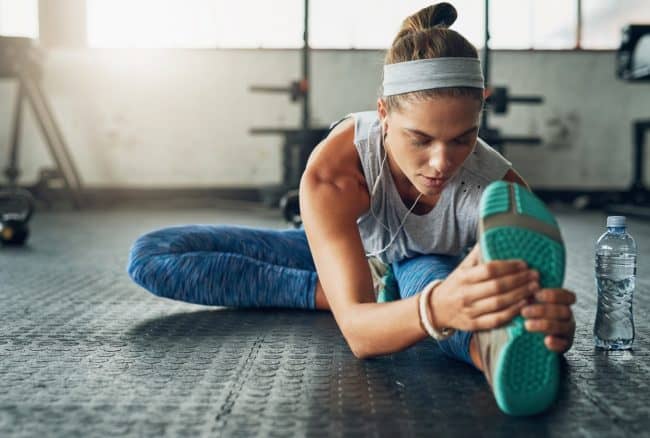
Developing good habits will help you maximize your exercise time. Did you know that the hours following a workout are essential to helping you maximize your efforts? Yes! Your post-exercise behaviors matter greatly!
It is recommended that adults get at least 150 minutes of exercise per week, which averages to about 30 minutes a day. Here’s a list of no-no’s and yes’s you want to keep in mind to ensure you don’t fall into traps or habits after workouts that can sabotage your exercise time.
Don’t sit or lay around the rest of the day – Keep Moving
Our body needs to move throughout the day, while awake. After a period of body inactivity, cells become resistant to insulin, a hormone that serves as a “key” to allow glucose to enter and serve as energy to fuel its metabolic needs.
Additionally, research has shown that just 2 hours of sitting decreases our body’s production of an enzyme that converts bad cholesterol to good cholesterol. Increased levels of bad cholesterol contribute to the build-up of fatty plaques inside our artery walls that impede blood flow to our heart and brain.
Don’t Pig Out – Refuel Right
Your body’s weight is ultimately a net of calories in versus calories out—if there is a positive balance, there is weight gain and vice versa.
Burning calories with exercise is imperative but can’t overcome bad eating habits. Unfortunately, there is a common misconception that after breaking a sweat, you can eat whatever you want. Wrong! Physical activity doesn’t burn as many calories as often thought and, too, the foods you eat can contain much more calories than often thought.
The number of calories you burn depends on your weight and type of physical activity. And, they can be wiped out in just minutes with the wrong food choices. Make sure to avoid candies, pastries and fast food. Instead, have a healthy snack ready to enjoy post- workout.
Don’t Disregard Cooling-Down with Stretches
Just like starting with stretches is important, stretching following a workout ensures important physical and mental benefits including increased flexibility, blood circulation, clearance of lactic acid (a waste product), energy, pain prevention, range of motion, muscle coordination, mental clarity and mind-body connection. Optimal stretching can vary from person-to-person. Aim for the major muscles, from head-to-toe, or vice versa so you do not skip a muscle group. Research ways to optimally stretch or consult with a fitness instructor to determine techniques that are best for your body’s needs.
Don’t Connect During or Immediately Following – Revel in the Disconnect
Texting or talking during a workout is a distraction that can impair your balance and intensity of your workout. If you want to turn-up your workout with some tunes, go right ahead but know too, that jumping onto your phone to check your texts, emails or social media can dampen your post-workout “euphoria” that results from the release of endorphins.
Don’t Weigh
Inflammation from your muscles trying to repair themselves can cause transient weight gain, due to water retention. And too, seeing you did not drop the pounds you strive to lose can be defeating – and may impact your motivation to continue. Instead, weigh yourself the following day.
Don’t Stop Drinking Water – Stay Hydrated
Hydration is essential before, during, and AFTER your workout. Being dehydrated can decrease your strength and high intensity endurance during exercise as well as slow your recovery, muscle protein synthesis, and clearance of waste products from muscle damage that occurs after your workout. You need to replace what you lost via sweat.
Don’t Drink Alcohol
Surprisingly, according to a study, those who exercise frequently tend to drink more than those who do not. But, unfortunately, exercise and booze do not go well together. During workouts, micro tears occur in your muscle, which your body then repairs. This results in muscle growing back stronger. But, your body sees alcohol as a poison and energy is spent trying to detox the liquor, instead of repairing muscle, healing, and growing. Additionally, alcohol is a diuretic, further dehydrating you.
Don’t Skimp on Sleep
Getting the right amount of sleep is essential. Your body and mind need a good night of ZZZ’s to adequately recharge.
When it comes to your fitness, the time you spend “working out” often gets all the credit—but it shouldn’t. If you know what to do after a workout, you’ll know exactly how to tweak your routine in order to maximize impact and results.
Dr. Nina Radcliff is dedicated to her profession, her patients and her community, at large. She is passionate about sharing truths for healthy, balanced living as well as wise preventive health measures.
She completed medical school and residency training at UCLA and has served on the medical faculty at The University of Pennsylvania. She is a Board Certified Anesthesiologist. Author of more than 200 textbook chapters, research articles, medical opinions and reviews; she is often called upon by media to speak on medical, fitness, nutrition, and healthy lifestyle topics impacting our lives, today.







